democracynow.org
Stories:

"My Four Months as a Private Prison Guard": Shane Bauer Goes Undercover to Expose Conditions
Between 2009 and 2011, Shane Bauer spent nearly two years locked up in an Iranian prison as one of the jailed American hikers. Last year, he went back to jail—this time as an undercover journalist working as a guard at a private prison in Louisiana. In a stunning new exposé for Mother Jones, Bauer chronicles the four months he spent undercover last year as a guard at Louisiana’s Winn Correctional Facility. Winn is the oldest privately operated medium-security prison in the country and sits in the state that holds the distinction as having the world’s highest incarceration rate—more than 800 prisoners per 100,000 residents. During Bauer’s investigation, Winn was run by the Corrections Corporation of America, the nation’s second-largest private prison operator. Bauer’s story offers a never-before-seen look at the for-profit prison industry, exposing conditions that include violence among inmates, poor medical and mental healthcare for even the sickest prisoners, mismanagement and lack of training for staff.
TRANSCRIPT
This is a rush transcript. Copy may not be in its final form.
AMY GOODMAN: We turn to a stunning new exposé for Mother Jones magazine looking at the world of privately run prisons.
JENNIFER CALAHAN: No structure. Unsafe. Just a bad place. Hell, in a can.
SHANE BAUER: This prison is crazy, beyond anything I ever imagined.
AMY GOODMAN: Mother Jones senior reporter Shane Bauer spent four months working undercover last year as a guard at Louisiana’s Winn Correctional Facility. It was not Bauer’s first time behind bars. Between 2009 and '11, he spent nearly two years locked up in an Iranian prison as one of the jailed American hikers. Louisiana's Winn Correctional Facility is the oldest privately operated medium-security prison in the country and sits in the state that holds the distinction as having the world’s highest incarceration rate—more than 800 prisoners per 100,000 Louisiana residents. During Shane Bauer’s investigation, Winn was run by the Corrections Corporation of America, the nation’s second-largest private prison operator. In one of the videos in the Mother Jones series, Bauer explains how he landed the job using his own name and personal information, despite his years as an award-winning journalist.
SHANE BAUER: I put in an application with the Corrections Corporation of America for prison guard jobs. A week later, I start getting calls. I was surprised how quickly it happened. I don’t know how long I’m going to be doing this. I don’t know where it’s going to take me. I don’t know what my job will entail.
NARRATION: November 2014, Shane Bauer applied to be a guard at Corrections Corporation of America, the nation’s second-largest private prison company. He used his real name and personal information.
SHANE BAUER: This company and these big private prison companies, in general, are kind of notoriously secretive.
MARGARET REGAN: Corrections Corporation of America began around 1983.
AL JAZEERA REPORTER 1: CCA, The GEO Group and MTC operate more than 130 facilities nationwide.
AL JAZEERA REPORTER 2: The combined revenues of these two companies reached $3.3 billion in 2014.
AMY GOODMAN: Shane Bauer’s story offers a never-before-seen look at the for-profit prison industry, exposing conditions that include violence among prisoners, poor medical and mental healthcare for even the sickest prisoners, mismanagement, lack of training for staff.
Well, for more, we go directly to Shane Bauer, joining us from San Francisco.
Welcome to Democracy Now!, Shane.
SHANE BAUER: Thanks for having me, Amy.
AMY GOODMAN: Talk about this process that you went through—truly astounding, given that you yourself were imprisoned for almost two years, that you decided you’d go back into prison as a prison guard.
SHANE BAUER: Well, I had been reporting on prisons for several years and was constantly coming up against a wall. It’s very difficult to get information from prisons in the United States. You know, if you go inside, you’re on kind of carefully scripted tours. Records requests sometimes take months; sometimes they don’t come back at all. And there have been occasional reports about private prisons from the Department of Justice, some media reports showing higher levels of violence than other prisons, you know, a high degree of understaffing. So, I had the idea to put in an application, specifically at a private prison company. These private prisons are even more secretive than their public counterparts. A lot of public access laws don’t apply to these prisons because they are not public institutions.
So, I went online, filled out an application for the Corrections Corporation of America using, you know, my real name and personal information. And I was getting calls within a week and doing interviews on the phone. These interviews were, you know, the kind of interview you might expect from a Wal-Mart. They didn’t ask me about why I wanted to work in a prison. They didn’t ask me about my job history. They would just ask me questions like, you know, "If your supervisor tells you to do something you don’t want to do, how would you respond?" The only prison—the only question that I actually was asked that had to do with prison was "What is your idea of customer service, and how does it apply to inmates?"
AMY GOODMAN: I want to turn to another clip from the video that accompanies your stories in Mother Jones. This offers a look at Winnfield, Louisiana, near the CCA-run Winn Correctional Facility.
SHANE BAUER: This part of America in particular is very poor. The main employers in the area are the lumber mill, Wal-Mart and CCA.
WINNFIELD RESIDENT 1: There’s really not too many jobs. You actually have to go out of town to find a job.
WINNFIELD RESIDENT 2: Logging woods or lumber mills.
WINNFIELD RESIDENT 3: Either you have a job or you’re selling dope. And that’s it.
SHANE BAUER: So people are willing to take a very dangerous job for $9 or $10 an hour.
AMY GOODMAN: So, Shane, talk about going into the jail, who the prison guards are, who the prisoners are.
SHANE BAUER: Well, Winn has about 1,500 inmates. It’s a medium-security prison. The average sentence there is 19 years. People are in for—you know, about 55 percent of the prisoners are there for violent crimes. I met prisoners that were there for having too many DUIs. So, it’s kind of a wide range of crimes.
The guards are mostly poor people from the town. It’s $9-an-hour job. And the town—you know, the average income, family income, in the town is $25,000 a year. And despite how poor the town was, the prison had a really hard time keeping up staff. People would start the job and leave pretty quickly. There was a really high rate of turnover. There were also a set of staff that were people who had kind of been in law enforcement or corrections and had been disciplined for prior infractions. I met one guard who had worked in a juvenile detention center and had been let go after he uppercutted a 16-year-old kid and shattered his jaw. So there’s this kind of set of people who can’t get work elsewhere, so they take this low-paying job. When I was in training, the head of training actually said to us—she said, you know, "People say that CCA is scraping of the bottom of the barrel, but that’s not really true. But if you are breathing and you have a driver’s license and you’re willing to work, then we’re willing to hire you."
AMY GOODMAN: Tear gas—explain the exposure to tear gas in the prison.
SHANE BAUER: Well, while I was in training, I had to be exposed to tear gas to kind of prepare us in case—you know, in case we were exposed to it inside. And when I worked in the prison, I saw a lot of use of pepper spray. There was a kind of corporate tactical team that was sent in during the time that I was there. And when they came in, the assistant warden said to us in a morning meeting—he said, "I believe that pain increases the intelligence of the stupid. And if these inmates want to act stupid, then we’re going to give them some pain to increase their intelligence level." And during the time that I was there, CCA used three times more chemical agents—pepper spray and tear gas—than the runner-up in Louisiana.
AMY GOODMAN: During your undercover investigation of Winn Correctional Facility, Shane, you came across a prisoner who had lost his fingers and legs due to lack of proper medical care.
ROBERT L. MARRERO: Mr. Scott complained about that for months to the medical staff at Winn. They gave him some—the equivalent of a couple of Motrin and told him to go away.
ROBERT SCOTT: Never saw a doctor. The whole time.
SHANE BAUER: He’s now suing the prison.
JENNIFER CALAHAN: The people that are working there as nurses and all that, they’re really not that qualified.
ROBERT L. MARRERO: There are doctors they can hire. There are doctors who are more or less affordable. I did some background checking on them, and one of them was a pediatrician who had lost his privileges to treat children.
AMY GOODMAN: CCA said it "is committed to ensuring that all individuals entrusted to our care have appropriate access to medical services as needed," unquote. Shane Bauer?
SHANE BAUER: Well, Robert Scott, you know, he had lost his legs and fingers to gangrene. And I ended up getting access to his medical records through his legal case, and it showed that he had made multiple requests to see a doctor. He would go to the infirmary complaining of intense pain. You know, his foot was blackening. And he was just given Motrin. And he was trying to go to the hospital, but he kept getting sent back. He says that he was accused of faking it, which was something I heard a lot at Winn. And, you know, part of the issue is that CCA, when they send prisoners to the hospital, they have to foot the bill. The state does not cover this cost. So, you know, when you’re bringing in $34 per inmate per day, taking them to the hospital is a huge expense.
AMY GOODMAN: We’re going to talk about prison breaks, escapes, riots, when we come back. We’re talking to Shane Bauer, who has this exclusive full issue of Mother Jones, investigation of CCA-run prison in Louisiana. It’s headlined "My Four Months as a Private Prison Guard," chronicling his time as an undercover correctional officer at the Louisiana Winn Correctional Center, run by CCA. Stay with us.
[break]
AMY GOODMAN: "Umi Says" by Yasiin Bey, here on Democracy Now!, democracynow.org, The War and Peace Report. I’m Amy Goodman, as we talk to Shane Bauer, the undercover investigative journalist who served four years as a prison—four months as a prison guard in a for-profit prison in Louisiana run by CCA, the Corrections Corporation of America. During Bauer’s time as a guard at the Winn Correctional Facility, there was an escape of a prisoner. In this clip, Shane talks about the incident and speaks with former Winn prison guards David Bacle and Jennifer Calahan.
SHANE BAUER: Today was my 12th day of training, and I found out as soon as I got to the prison that yesterday there was an escape.
DAVE BACLE: He was out there on the small yard, on the basketball—what we call the basketball side, where you, you know, play basketball.
JENNIFER CALAHAN: He was able to climb over the fence.
DAVE BACLE: He went up the fence, got on the roof of the building, the double chain-link fence, 12-, 15-foot high, something like that, climbed up it, got over both razor wires.
SHANE BAUER: Ran through the forest, stole a hunter’s truck.
DAVE BACLE: Got on the road, got stopped at a roadblock. Because of his nervousness, he gave himself away, got busted.
SHANE BAUER: The prison staff didn’t actually know that he escaped for two, three hours.
DAVE BACLE: Not enough people for security.
SHANE BAUER: There are four or five guard towers around the prison. And around four years ago, the company decided to replace the guards in those towers with cameras. If there had been guards in those towers, they would have almost certainly seen somebody trying to jump the fence.
DAVE BACLE: No "if"s, "and"s, "but"s about it.
AMY GOODMAN: Shane Bauer, talk more about this and what happens with escapes.
SHANE BAUER: Well, when I was working at Winn, I would come in every morning at 6:00 and go to a morning meeting, where all security staff that were showing up for the shift would, you know, show up at this meeting. And there were days that there were 24 guards. You know, some days there might have been 28. This is for 1,500 inmates. This is far below the number of guards that CCA is required to have by its contract.
So, you know, this person, in the middle of the day, was able to climb over a fence without anybody seeing him. It was hours before they even knew that he was gone. When the perimeter alarm went off in the control room, the person who is watching the cameras just turned the alarm off and went back to what she was doing. And, you know, this goes back to some of the issues with training. I went through four weeks of training there. Some days we literally sat there all day long doing nothing. Many days we would get two hours where somebody would be standing in front of us reading company policy. You know, I felt very ill-prepared to really go into this job when I started.
AMY GOODMAN: Shane, while you were at Winn, tensions grew high at the facility. In this Mother Jones video, it goes inside during the turmoil.
SHANE BAUER: The prison has been on lockdown for about a week. CCA has sent in SORT teams from its prisons around the country to try to bring Winn under control.
"CORNER STORE": SORT team is like a wrecking crew. You know, they dress them all in black. They normally whoop ass first and take names later.
SHANE BAUER: They’re basically going throughout the entire prison very thoroughly and methodically.
JENNIFER CALAHAN: Tear the mattresses up, tear the vents up—whatever they need to do to find any contraband.
SHANE BAUER: Strip-searching inmates, searching toilets, searching their lockers. People are getting angry. They’re lashing out. I thought that there was going to be a riot in the unit that I work in.
CCA EMPLOYEE: If we want to act like refugees and animals, then we can do—
PRISONER 1: We’re not acting like it. That’s how we’re being treated.
CCA EMPLOYEE: Listen to what I’m saying.
PRISONER 1: That’s how we’re being treated. We ain’t got nothing.
SHANE BAUER: They were supposed to get canteen today, which they haven’t had for three weeks. They just kind of start freaking out. They said, "No COs are going to come on the tier. We’re not doing count. We’re not cooperating. We’re going to riot."
PRISONER 2: This is the incompetence that’s causing these problems, the inability to be able to run this place in a professional manner. The people here are so lazy, from word say go. And their solution to the problem is, lock everybody down. Come on, man. You need a brainiac, somebody that could think, somebody that could come in here with finesse and run the prison and deal with these problems.
AMY GOODMAN: So, Shane Bauer, talk about what ultimately happened.
SHANE BAUER: Well, there had been a lot—while I was there, there was more and more stabbings. There, you know, were weeks that there were multiple stabbings happening. And I saw people stab each other in front of me. And when I was in training, we were told that when we see two inmates stabbing each other, our job is just to tell them to stop, and radio for backup. We’re not meant to intervene. Our trainer told us that it’s not worth it, we don’t make enough money to put ourself in that situation, and that what’s important is that we go home at the end of the day. He actually said to us, "If these fools want to cut each other up, happy cutting."
The prison was really dangerous. After these tactical teams, the SORT teams, came in, they swept through the prison and, you know, were searching for contraband and weapons. They found, in the first two months of the year, 200 weapons at Winn. That’s more than 20 times more than Angola, the maximum-security prison in Louisiana. This violence, the escape, a lot of the incidents that were happening at Winn drew the attention of the state Department of Corrections, so they also eventually took over. So, at one point, the prison was being run by corporate tactical teams and guards from around the state, as well as the local staff.
AMY GOODMAN: Shane, Democracy Now! reached out to the Corrections Corporation of America for response to your article. CCA Director of Public Affairs Jonathan Burns issued a statement. It reads, in part, quote, "This story, how it was developed and what ultimately was published says more about the reporter’s activist agenda and the publication’s low journalistic standards than it does about our company or the very real challenges facing our criminal justice system in America. From the start, Mother Jones clearly intended to publish a deliberate hit piece to advance a predetermined premise at the expense of numerous laws, widely accepted journalistic standards, a fully informed readership and even the safety and security of a correctional facility. This point is underscored by the numerous examples in the piece in which the reporter clearly admits failing to perform the security duties of his job, which were intended to keep inmates and his colleagues safe." Again, those the words of the director of public affairs for the Corrections Corporation of America, Jonathan Burns. Your response, Shane Bauer?
SHANE BAUER: When I started at Winn, my job was to work as a prison guard. I was called—I was pointed out for promotion within just a few months. Right before I left, I was offered a promotion. And the culture at Winn was one where guards did not do security checks. There were guards that were recording that security checks were happening every half hour, which is what was required. So that meant that guards were required to walk through the units, to walk through the dorms, and just check up on everybody. That didn’t happen. There wasn’t enough staff for that to happen. When I went to Winn, I noted and documented in detail what I saw. And while I was at Winn, one guard that I worked with actually said to me, "I wish that an investigative reporter would come and investigate this prison." There was widespread frustration, not just with inmates, but also with staff, on how the company was running the prison. And the things that I saw were long-standing. I mean, these were not issues that started when I arrived there.
AMY GOODMAN: Shane, the video you have from inside, explain how you got it.
SHANE BAUER: Well, my lawyer would not be happy with me if I talk in detail about where that video comes from. I, you know, have to protect Mother Jones and our sources from retaliation. But I will say that it was very important to me, given the stakes of this investigation, to document very accurately what was happening there and what I was seeing and hearing people say.
AMY GOODMAN: And you even write about a pen that you used, that you put in your shirt, that was an audio recorder.
SHANE BAUER: I did have recording devices while I was working there.
AMY GOODMAN: Shane, your undercover investigation in Winn Correctional Facility ended suddenly, when your colleague, James West, was arrested filming outside the prison. This is footage of the arrest.
POLICE OFFICER 1: His name must be James West.
POLICE OFFICER 2: What kind of pictures you got there?
JAMES WEST: They’re my pictures, sir.
POLICE OFFICER 2: What you took here don’t belong to you. You got it on a SD card?
JAMES WEST: Uh-huh.
POLICE OFFICER 2: Let’s have it.
JAMES WEST: No, sir. I’m not going to show you that.
POLICE OFFICER 2: I will take everything you got. Whoa, come here. Hey, come here. Hey.
JAMES WEST: You can’t take my camera.
POLICE OFFICER 2: I’m allowed—I’m going to tell you one time to hand me the camera. You hand me that.
POLICE OFFICER 1: I think the best thing to do is just seize his camera.
POLICE OFFICER 2: I think so.
POLICE OFFICER 1: And we’ll get a search warrant, and we’ll look at them pictures.
POLICE OFFICER 2: If you don’t want to give it to me, I will take it.
JAMES WEST: What am I being arrested for?
POLICE OFFICER 2: Trespassing.
POLICE OFFICER 1: Trespassing. You want to go ahead and—turn and put your hands behind your back.
JAMES WEST: I’m cooperating and—
POLICE OFFICER 2: No, you’re not cooperating.
POLICE OFFICER 1: No, you ain’t. You have the right to remain silent. Anything you say can and will be used against you in a court of law. Welcome to the free state of Winn.
AMY GOODMAN: Shane, this brought your investigation to an end. Explain what happened.
SHANE BAUER: I, you know, went home that night to get some sleep, because I had to work the next morning at the prison, and found out in the middle of the night that James had been arrested. He spent 24 hours in jail. And when he was released, we basically packed up my apartment and headed straight to Texas. I called in and resigned. And the head of HR said—you know, she said that she was surprised to hear that I was quitting, because she thought that I was going to promote. And it shortly—
AMY GOODMAN: To be—you were going to be promoted?
SHANE BAUER: Right, right.
AMY GOODMAN: Shane, we only have a minute, and I just wanted to ask if you could talk about how you, yourself, were affected by being a guard, from being a prisoner in Iran to being a guard here, and your changing mentality?
SHANE BAUER: That, the psychological aspect of working there, ended up taking most of my energy. You know, I went in there as a reporter, and over time, more and more of my attention was focused on the job of being a guard, which was extremely difficult. I was working in a unit with 350 prisoners with just one other floor officer. And I saw myself, over time, harden and become more and more strict and really just numb to the needs of the prisoners. I was focused on how to get through and how to survive in this really dangerous environment.
AMY GOODMAN: Well, Shane, I want to thank you for being with us. We’ll link to the whole issue of Mother Jones magazine and the amazing reports, video reports, from James West. Shane Bauer, award-winning senior reporter at Mother Jones. His most recent article is titled "My Four Months as a Private Prison Guard," chronicling his time as an undercover correctional officer at Louisiana’s Winn Correctional Center, run by the Corrections Corporation of America. Shane is also co-author of the memoir A Sliver of Light: Three Americans Imprisoned in Iran.
And that does it for our show. Happy birthday Jon Randolph. Democracy Now! has a news producer and a senior video news producer position open. Check it out at democracynow.org. I’ll be speaking in Chicago on Friday night. Go to our website at democracynow.org. ... Read More →

Making Sense of Brexit: Paul Mason on Britain's Growing Economic & Political Crisis
Britain remains in a widening crisis days after voters chose to leave the European Union. British Prime Minister David Cameron has announced his resignation. Labour leader Jeremy Corbyn is facing a coup within his own party as more than a dozen members of his shadow cabinet have resigned or been sacked. Scotland has announced it will take any steps needed to stay inside the European Union, including possibly holding a second independence referendum. Meanwhile, U.S. Secretary of State John Kerry is headed to Brussels and London to discuss the political and economic upheaval caused by the Brexit vote. To make sense of what’s happening, we speak to longtime British journalist Paul Mason, who has worked at the BBC and Channel 4. His new book is titled "Postcapitalism: A Guide to Our Future"
TRANSCRIPT
This is a rush transcript. Copy may not be in its final form.
AMY GOODMAN: Britain remains in a widening crisis days after voters chose to leave the European Union in their Brexit vote. British Prime Minister David Cameron has announced his resignation. Labour leader Jeremy Corbyn is facing a coup within his own party as more than a dozen members of his shadow cabinet have resigned or have been sacked. On Sunday, Hilary Benn was removed as the Labour Party shadow foreign secretary.
HILARY BENN: He’s a good and decent man.
ANDREW MARR: So was it hard for you?
HILARY BENN: He’s a good and decent man, but he is not a leader. And that is the problem.
AMY GOODMAN: Opposition leader Jeremy Corbyn has rejected calls to step down as opposition leader, saying now is the time for the party to stand up for its values.
JEREMY CORBYN: Our policies on trade, economy and migration will have to change in light of the referendum vote. But that cannot be left to the likes of Johnson, Farage and Gove. Labour will fight to ensure that our agenda is at the heart of the negotiations over withdrawal from the European Union that lie ahead, including the freedom to shape our economy to work for all, maintain social and employment protections that benefit all, and that whoever leads the government is intensely held to account, to democratic account, throughout the whole process.
AMY GOODMAN: Scotland has announced it will take any steps needed to stay inside the European Union, including possibly holding a second independence referendum. On Sunday, Scotland’s First Minister Nicola Sturgeon said the country will do whatever it takes to remain in the EU. Meanwhile, Northern Ireland’s deputy leader, Martin McGuinness, called Friday for a vote to unite the two sides of the Irish border.
Global stock markets have plummeted. More than $2 trillion was wiped off global equity markets on Friday in the biggest daily loss ever. Earlier today, the British pound hit a 31-year low. Meanwhile, Secretary of State John Kerry is headed to Brussels and London to discuss the political and economic upheaval caused by the Brexit vote.
To make sense of what’s happening, we go now to London, where we’re joined by longtime British economics journalist Paul Mason, who has worked at the BBC and Channel 4. His new book is titled Postcapitalism: A Guide to Our Future.
So, talk about the fallout from the Brexit vote, Paul, and also why this vote to leave the European Union ever even took place.
PAUL MASON: Well, the vote to leave the European Union took place because, repeatedly, 25 percent of British voters were, in fair elections—that is, the proportional representation system—were backing a party that wants to leave the European Union. And this impacted onto the Conservative Party, and it made it necessary for David Cameron to take a gamble of having a referendum to bury the issue for a generation, though he gambled and lost, because Cameron wanted to stay in the European Union. Fifty-two percent of British voters voted to leave. And as a result, Mr. Cameron, who’s signaled his resignation but is not yet gone, will go down in history as the Conservative leader who, first of all, destroyed the European Union—I mean, we have left the major bloc in the world economy—and he’s going to destroy the United Kingdom, as well, because, as you suggested in the introduction, Scotland will leave.
Now, the overwhelming issue behind this vote was migration. And what we had was, basically, not just the kind of people who might support Glenn Beck and kind of Donald Trump arguing that migration had gone too far, but, as it turns out, many people who are organic and core supporters of the Labour Party. The free migration from East Europe and South Europe into the United Kingdom has brought about 3 million people over the last 10 years. And in many small communities, they feel—the people who are already here, including many black and Asian people, just said, "It’s too many." And there’s no way of stopping it without leaving Europe. That was made very clear to them. This is what tipped the vote.
AMY GOODMAN: Paul, talk about who voted for leaving and who voted for staying. And also, the age—wasn’t it true that—
PAUL MASON: Yeah.
AMY GOODMAN: —most young people voted for staying in the European Union?
PAUL MASON: Sure. Seventy-four percent of young people who voted voted to stay in the European Union. The only problem is, we think somewhere between 35 and 45 percent of that age group actually voted—much, much lower than any other age group. The dislocation from politics meant that the people for whom this is going to mean the most had the least say. Now, many of them on social media are really angry. They want a—there is great support among them—politically, unfortunately, quite naïve people—for the idea that Parliament can cancel it all or that we can have a petition that cancels it all. It’s not going to be canceled. It’s happened.
Now, demographically, it’s—let me try and explain this to United States readers. If you—London and Scotland voted to remain. Northern Ireland, by a majority, voted to remain. What did all those places have in common? They had a narrative that explains why remaining in Europe, even despite one’s criticisms of it, was a good idea. The Scots had a left cultural nationalism. London is a buzzing multicultural city. But Northern Ireland, it was, by and large, the Catholic population which voted to stay in, because they see staying in Europe as a link to Southern Ireland, which they—you know, some of them would ultimately like to join. Who voted to leave was small towns. Small towns were the bedrock, small towns where the private sector provides mainly low-skill, low-wage jobs and where there’s not so much unemployment, but a high degree of sort of drabness and lack—you know, there’s no cinemas, there’s no stores other than the basic kind of low-rent stores. And small-town Britain just attributed this—basically, the victimhood of neoliberalism to, I think, the wrong—the wrong course. They saw migration as the key thing that had changed in their lives in the last 10 years, and they said, because some evidence points to it at the low end of the economic scale, "Migration is hitting our wages. It’s causing stress to our public services. We can’t rent. There’s a big shortage of rent and accommodation." And when people like me said the real issue here is capitalism, the real issue here is neoliberalism, they would say, "Well, OK, but stopping migration still makes it better." And ultimately, we—the shock on the night was that some university towns, you know, some towns that are high public service employment, therefore quite high unionization, maybe 30 percent black or Asian in ethnic mix, and with a couple of universities, voted to leave—so, Nottingham, Newport in Wales, Sheffield, where I went to university. These are kind of places like Ann Arbor, Michigan, and they still voted to leave.
AMY GOODMAN: What’s happening to Jeremy Corbyn right now?
PAUL MASON: Right now, behind me in the Parliament, there is a revolt of his own MPs. I think he won’t be able to face that down. And what it will lead to is another leadership election. I think this is the last thing we need. I think it’s driven by—there’s quite a big middle-class hysteria since the vote. The people really are feeling, "My whole life was shaped around the European Union." European Union is kind of the soul of the democratic and social justice story here in Britain. And many of those MPs have just lost their nerve. They say they don’t think Jeremy Corbyn can win the election. I think, for the right wing of the Labour Party, the neoliberal wing, their fear is he can win the election, because the Conservative government barely exists. There is actually no policy at the moment, behind me, from the Conservative government about what they’re going to do about negotiations with Europe, about what they’re going to do about the public finances. There is effectively no budget. There is effectively a chancellor who’s on borrowed time. He’s our finance minister.
So Corbyn should be in a strong position, but his own party really want to cause civil war, so we’re going to have that. I think we’ll have an election in the autumn. If Corbyn survives this leadership challenge, we have a chance of having the first radical-left government in the developed world, you know, from a big country. And I’m sure, absolutely sure, that these challenges to Corbyn are being coordinated by the political representatives of big business and, you know, TTIP and free trade. You know, that’s who’s behind it. Who they put up to challenge him, we’ll find out by, say, in the next 24 hours.
AMY GOODMAN: And can you talk about who could be the next prime minister?
PAUL MASON: Well, this Conservative MP, former mayor of London, Boris Johnson became the figurehead of the leave campaign. He’s come out this morning with a very emollient position. So, the leave campaign was saying, "Let’s walk way from Europe and just sign a free trade deal and go global." Today Johnson is saying, "Let’s not walk away from Europe." He’s implied they have to sign a single-market deal with Europe that would keep them within most of the European Union’s regulations. So I think he’s looking like the favorite. And then, from the remaining—remain side, there is a female minister called Theresa May, who is our justice minister right now, and I think she’s going to be the one who puts up. But ultimately this is a shattered party. They just destroyed the thing that they exist—they’re called the Conservative and Unionist party, meaning they favor the United Kingdom remaining together. And as result of what they did, we will leave Europe, and Scotland will leave the U.K.
AMY GOODMAN: And talk about the effect on Northern Ireland and Ireland, what’s happening there, with Northern Ireland, like Scotland, saying no to Brexit.
PAUL MASON: Well, Northern Ireland didn’t unanimously say no. The unionist community, the Protestant community, many of them said they wanted Brexit. And the main unionist party, the Democratic Unionist Party, which is the more hardline, sectarian Protestant party, really did campaign for leaving Europe. Now, why? Because the border—you know, you’ll know, your listeners and readers will know, that the—and viewers will know, that the border between Northern and Southern Ireland has been the subject of two civil wars, a 20-year-long civil unrest and guerrilla warfare. Now, the point is that, with the European Union, that border was being eroded. Economically, you could cross it. And, you know, people could travel without really having to go through checkpoints. And those kind of developed a kind of understanding that, you know, Northern Ireland and Southern Ireland, despite years of warfare, probably have a common, shared destiny. Now, for the Catholic population, or the anti-unionist population, many of them now want a referendum to reunite with Ireland. At the moment, there’s no party in Britain that’s going to—ruling party that’s going to deliver that. But it just has left, I mean, what we’ve been seeing over the weekend. And this is the interesting thing. Within the Protestant community, the kind of more—the kind of middle classes, they—every Protestant in Northern Ireland has the opportunity to apply for a Southern Irish passport. And amazingly, we’ve been seeing people who have spent their entire lives committed to maintaining Northern Ireland as a separate entity within that island applying for—applying for Southern Irish passports. In other words, we’re seeing an amazing kind of almost cultural shift among the Northern Irish population towards thinking about what their future is, once Britain, as it will, leaves the European Union.
AMY GOODMAN: On Saturday, Greek Prime Minister Alexis Tsipras said he did not blame the British people for voting to leave the European Union, but rather he blamed EU leaders.
PRIME MINISTER ALEXIS TSIPRAS: [translated] The chronic deficiencies of European leadership, the insistence on extremely unjust austerity policies and knee-jerk xenophobic reflexes and anti-immigration rhetoric have been feeding populism, chauvinism and nationalism for a long time. As much as the British people’s decision troubles and saddens us, we must consider it a completely respectable decision, one that confirms there is a crisis of identity in Europe, a strategic crisis.
AMY GOODMAN: That’s Greek Prime Minister Alexis Tsipras. Paul Mason, your response?
PAUL MASON: Well, I think he’s essentially right. What we should say, first of all, is that 52 percent people who voted to leave the EU, not all of them are racist and xenophobes. They had legitimate economic concerns, and many of them, like me, had severe criticisms of the European Union’s action over Greece. This drove both a kind of left- and a right-wing response to Europe, which I tried to stop. I thought it would be a bad idea to leave now, but most people, 52 percent of people, said they want to leave. Now, Tsipras is right that this is essentially a crisis of European neoliberalism. We have governments in the center of Europe—Germany, France, Italy—committed to austerity, even as their own economy goes down the tubes. The Lisbon Treaty, which is the founding treaty of the European Union, mandates that they have to do the opposite of what, say, Janet Yellen has done or what Democratic treasury secretaries under Obama did, which is expand the economy. In a crisis, they’re mandated to shrink the economy. This is killing the Europe—I mean, in other words, the European Union is killing the ideal of Europe. And Tsipras is right to worry about the right-wing backlash.
But even more urgent now for us is that what this is going to do—I mean, look, the market’s response today, wiping $2 trillion off shares worldwide, is not about Britain. It’s about what happens to the European Union. If we now see wave after wave of demands for other referendums and other countries beginning to leave—Greece should be the last one to leave, actually, but others might. And at that point, this 500 million-strong economic bloc, which is supposed to function and be one of the keystones, the capstone even, of the global world economic system, is disintegrating. And only that European Union stands behind the banking system. If the European Union breaks up into separate nations, then each of them will have to stand behind their own banking system, and their own banking system is already half-collapsed. That’s what is frightening the markets. ... Read More →

Trump Hails Brexit Vote: When the Pound Goes Down, More People Come to My Scottish Golf Course
Global stock markets have plummeted in the days since Britain voted to leave the European Union. More than $2 trillion was wiped off global equity markets on Friday in the biggest daily loss ever. Earlier today, the British pound hit a 31-year low. On Friday, Republican presidential candidate Donald Trump spoke in Scotland at the Trump Turnberry golf course. He celebrated the Brexit vote. "When the pound goes down, more people are coming to Turnberry, frankly," Trump said.
TRANSCRIPT
This is a rush transcript. Copy may not be in its final form.
AMY GOODMAN: I wanted to ask you about Trump’s visit to Scotland to push his two golf courses. He has banned your colleague—right?—Ewen MacAskill of The Guardian.
PAUL MASON: Yeah.
AMY GOODMAN: Ewen MacAskill and his photographer—Ewen MacAskill is known for also interviewing Ed Snowden when he was in Hong Kong.
PAUL MASON: Ed Snowden, yeah.
AMY GOODMAN: And also his response to the Brexit vote, where he faced a barrage of protests and a boycott by a series of politicians, including Scotland’s first minister.
PAUL MASON: Yeah, yeah.
AMY GOODMAN: Trump commented on the Brexit vote during a news conference at his Trump Turnberry golf resort.
DONALD TRUMP: Nobody knows. Look, if the pound goes down, they’re going to do more business. You know, when the pound goes down, more people are coming to Turnberry, frankly. And the pound has gone down. And let’s see what the impact of that has. But I think places like Scotland and England and different places in Great Britain, I think you’re going to see a lot of—a lot of activity.
AMY GOODMAN: So there you have it, Donald Trump saying what’s—with the pound going down, that would be good for his golf course. Can you respond to—
PAUL MASON: His visit has just been relentless comedy, I’m afraid. And any of your viewers who are thinking that this man might become the president of the United States need to really worry, because he arrived and said, "What a great result. The people have got their way, to leave," but he’s in Scotland. Scotland voted to remain. And Scotland will probably now leave the United Kingdom.
And as for what he said there about the pound falling being a good thing, well, if we were an export-driven economy and we had an industry left—Margaret Thatcher, unfortunately, destroyed our industry—that might be true. But we are largely an importing economy and a service-driven economy, which can only really carry on with our own current economic model, the finance-driven, financial services-driven model, if we remain part of Europe. You know, what’s threatening the share price of major British banks right now is the fear that they will lose their ability to trade in Europe. So, Trump is just completely wrong, and also crass, I think, in the way that he’s kind of blundered in here. And, I mean, remember Sarah Palin in the 2008 referendum—election in the United States, didn’t—you know, didn’t know much about the rest of the world, couldn’t—you know, really couldn’t tell you much about, for example, Russia. This guy has come into our country and gone to the very place and said the very opposite thing compared to reality.
And, you know, I think, quite right, no major politician has met him, because he’s not only toxic, he’s seen here as a racist. And we have a Muslim mayor of the city I’m sitting in, and a Muslim mayor who, under Trump’s proposals, would not be able to visit the United States.
AMY GOODMAN: How does Trump supporters compare to those in the Britain First movement in Britain who were pushing for Brexit?
PAUL MASON: The Britain First movement is a tiny fascist group which wears uniforms, like these people that have been perpetrating crimes today in the United States. They are a ultra-rightist, almost Ku Klux Klan-like group. That is one thing. The leave campaign, 52 percent of people voted leave, look, this is way broader than Trump. United Kingdom Independence Party, which is this party that has one member of Parliament but is very influential, they are more like the tea party. But I have to say that what we have in Britain, you know, there are some extreme social conservatives who, for example, would want to ban abortion, and have very reactionary and racist views on ethnic minorities, but really they are a much smaller minority, and therefore even the people who wanted a hard exit from Europe and don’t want migration, they are very careful about using any kind of language that’s racist. It’s often what we call dog-whistle racism. But I would say, look, the 52 percent vote to leave is not the equivalent as if Trump got 52 percent in the election. It’s way, way more broader than that.
AMY GOODMAN: Well, Paul Mason, I want to thank you for being with us, journalist and filmmaker. His recent opinion piece for The Guardian is headlined "Corbyn delivered the Labour vote for remain—so let’s get behind him." Mason’s new book is Postcapitalism: A Guide to Our Future.
This is Democracy Now! When we come back, Mother Jones has devoted its whole next issue to an undercover investigation of a Louisiana for-profit prison run by the Corrections Corporation of America. An unusual independent journalist went undercover there. His name is Shane Bauer. You may know his name because he was in a prison. Well, he was imprisoned in Iran for two years. And now he’s come back to serve as a prison guard to investigate the prison. Stay with us.
[break]
AMY GOODMAN: "Between the Wars" by Billy Bragg. You can go to democracynow.org to see our interviews with the British rocker. This is Democracy Now!, democracynow.org, The War and Peace Report. I’m Amy Goodman.
... Read More →
Headlines:U.K. Crisis Widens After Brexit Vote; Corbyn Faces Coup Within Labour Party
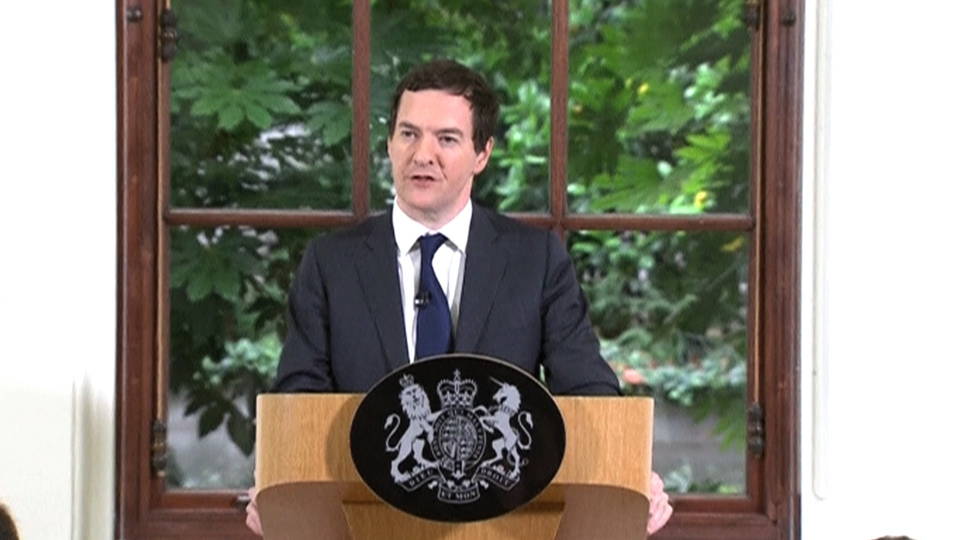
Britain remains in a widening crisis days after voters chose to leave the European Union. British Prime Minister David Cameron has announced his resignation. Labour leader Jeremy Corbyn is facing a coup within his own party as more than a dozen members of his shadow cabinet have resigned or been fired. Scotland has announced it will take any steps needed to stay inside the European Union, including possibly holding a second independence referendum. Global stock markets have plummeted. More than $2 trillion was wiped off global equity markets on Friday in the biggest daily loss ever. Earlier today the British pound hit a 31-year low. With his own political fate uncertain, British Finance Minister George Osborne sought to reassure the British people.
George Osborne: "It will not be plain sailing in the days ahead. But let me be clear, you should not underestimate our resolve. We were prepared for the unexpected, and we are equipped for whatever happens. And we are determined that, unlike eight years ago, Britain’s financial system will help our country deal with any shocks and dampen them, not contribute to those shocks or make them worse."
U.S. Secretary of State John Kerry is headed to Brussels and London to discuss the political and economic upheaval caused by the Brexit vote. Meanwhile, Baroness Sayeeda Warsi, the first Muslim woman to serve in the British Cabinet, says the vote to leave the EU has sparked an uptick in racist abuse. We’ll have more on Brexit after headlines.
TOPICS:
Britain
Jeremy Corbyn
Conservatives Win Most Seats in Spanish Elections; Podemos Comes in Third
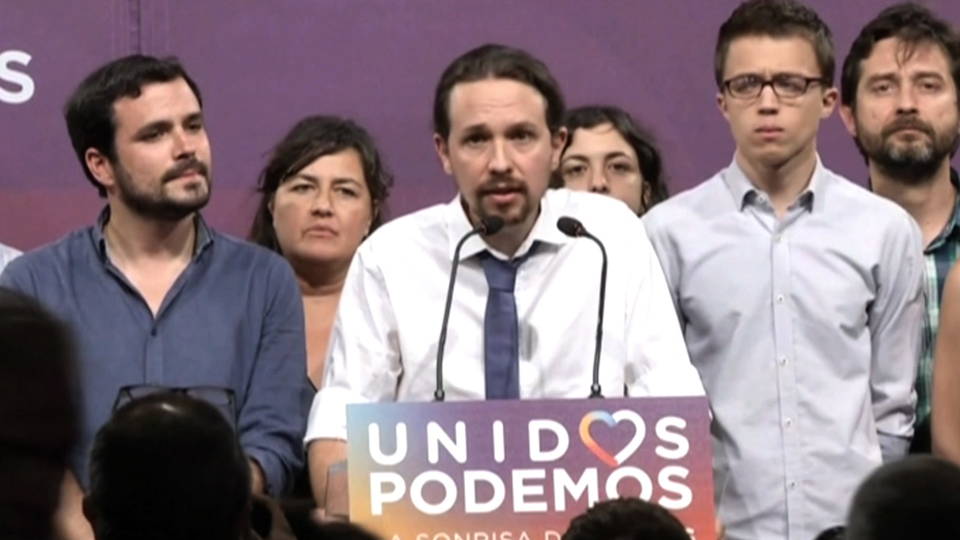
In Spain, the conservative People’s Party of acting Prime Minister Mariano Rajoy has won the largest number of seats in Parliament, but fallen short of an outright majority. The Socialist party came in second, with the left-wing Unidos Podemos alliance coming in third. Podemos leader Pablo Iglesias said the results were disappointing.
Pablo Iglesias: "I want to say that the results tonight are not satisfactory for us. We had different expectations. We are also worried about the loss of support from the progressive bloc. It’s true that we consolidated ourselves as the political option which would have a determining role in the present and future of our country. It’s true that what we have done in the past two years is historic and unprecedented in the history of our country. But it’s also true that we expected different electoral results tonight."
TOPICS:
Spain
California: At Least 7 Stabbed in Clashes Between White Nationalists, Counterprotesters
In California, at least seven people have been stabbed and 10 hospitalized after a confrontation between white nationalists and anti-racist counterprotesters at the state capital in Sacramento. White nationalist leader Matthew Heimbach said only one of the people injured was from his group, the Traditionalist Worker Party, which organized the rally to "make a statement about the precarious situation our race is in" after what it called "brutal assaults" at Donald Trump events. Hundreds of anti-racist demonstrators outnumbered the white nationalists.
Columnist George Will Leaves GOP over Donald Trump
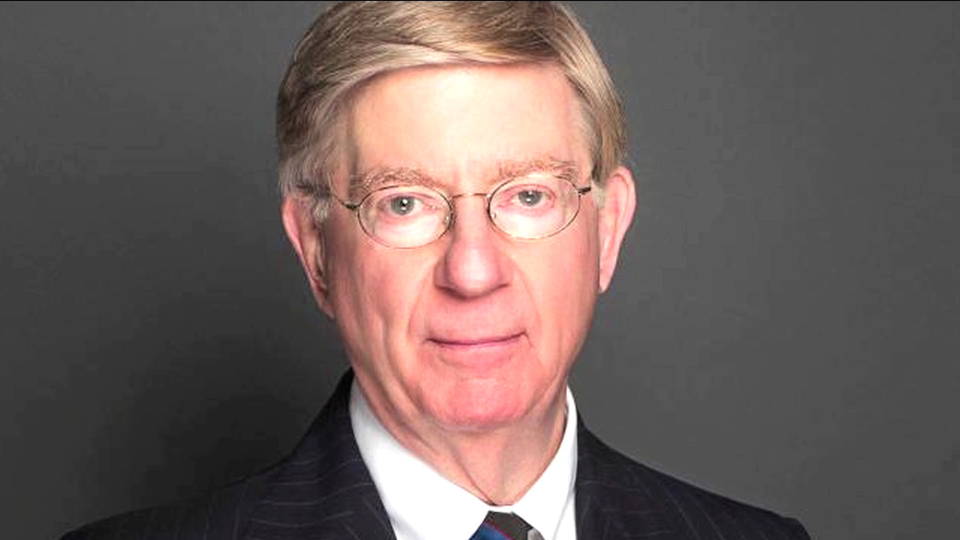
The leading conservative columnist and commentator George Will has left the Republican Party over the presumed nomination of Donald Trump. Speaking on Fox News Sunday, Will said he had changed his voter registration in Maryland to "unaffiliated" 23 days ago.
George Will: "Shortly after Trump became the presumptive nominee, he had a summit meeting with Paul Ryan, where they stressed their common principles and their vast shared ground, which is much more important than their differences. I thought that was puzzling, doubly so because Paul Ryan still didn’t endorse him. After Trump went after the Mexican judge from northern Indiana, then Paul Ryan endorsed him. And I decided that, in fact, this is not my party anymore."
Will did not say whom he would support in the 2016 election.
Senate Majority Leader McConnell Refuses to Say If Trump Qualified to Be President
In the latest sign of discord between Trump and the Republican Party, Senate Majority Leader Mitch McConnell has refused to say whether Trump is qualified to be president. McConnell was questioned Sunday by ABC’s George Stephanopoulos.
George Stephanopoulos: "Sixty-four percent of Americans say they don’t think that Donald Trump is qualified to be president. Do you believe he’s qualified? And how do you convince all those voters who think he isn’t?"
Sen. Mitch McConnell: "Well, look, I think there’s no question that he’s made a number of mistakes over the last few weeks. I think they’re beginning to right the ship. It’s a long time until November. And the burden obviously will be on him to convince people that he can handle this job."
Guardian Journalists Barred from Trump Event in Scotland
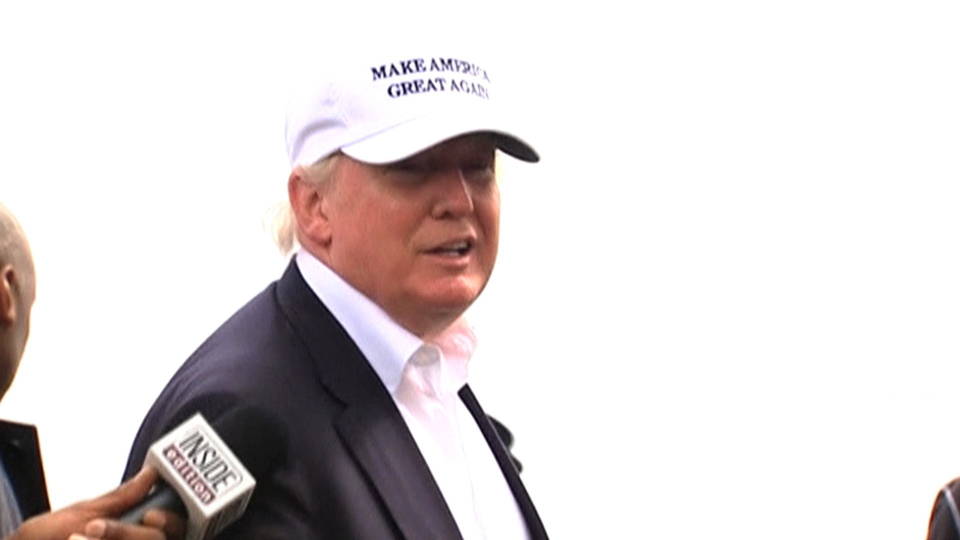
Trump has barred yet another journalist from his events. During Trump’s two-day visit to his golf resorts in Scotland over the weekend, Guardian reporter Ewen MacAskill asked Trump about how British politicians weren’t meeting with Trump because he is "regarded as toxic." Trump called him a "nasty guy." The following day, Ewen MacAskill and a Guardian photographer were denied entrance to Trump’s golf course. A security press list reportedly had "No Guardian or Buzzfeed" penciled on top. Among other outlets whose journalists have been booted from Trump events or explicitly banned are Politico, Univision, The Huffington Post, The Daily Beast and The Des Moines Register.
TOPICS:
Scotland
Donald Trump
DNC Platform Committee Rejects Proposals Against Fracking, TPP, Israeli Occupation
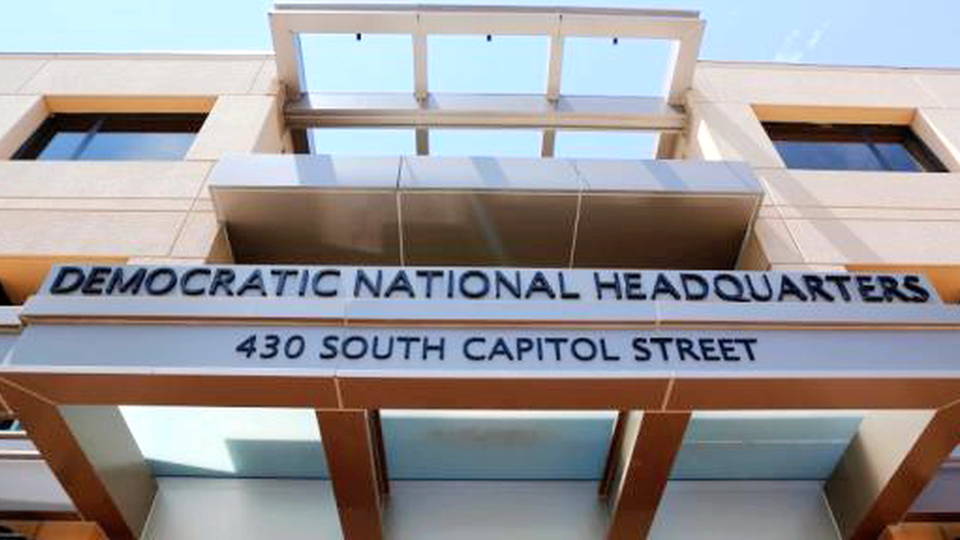
The committee drafting the Democratic Party’s platform has rejected a number of measures proposed by members appointed by Bernie Sanders. Meeting in St. Louis, Missouri, on Friday, members rejected measures to oppose the Trans-Pacific Partnership, or TPP, declare a national moratorium on fracking, and call for a $15-an-hour federal minimum wage and an end to Israeli occupation and illegal settlements. Sanders said he was "disappointed and dismayed" by the defeat of proposals on trade, but "pleased" over language about breaking up big banks. Speaking on MSNBC’s "Morning Joe" Friday, Sanders said he has turned his focus to the party platform.
Nicolle Wallace: "Are you going to vote for Hillary Clinton in November?"
Sen. Bernie Sanders: "Yes. Yeah, I think the issue right here is, I’m going to do everything I can to defeat Donald Trump. ... What my job right now is, is to fight for the strongest possible platform in the Democratic convention. And as we speak, in St. Louis, that’s going on right now. And that means a platform that represents working people, that stands up to big money interests. And that’s what we’re trying to do."
TOPICS:
Democratic Party
Bernie Sanders
TPP
Fracking
Israel & Palestine
DNC Platform Includes Historic Call to Repeal Anti-Choice Hyde Amendment
Hillary Clinton’s campaign hailed the draft Democratic platform as "the most ambitious and progressive our party has ever seen." For the first time, the platform includes an explicit call to repeal the Hyde Amendment, the decades-old ban on federal funding for abortion which disproportionately impacts the poor and women of color. In related news, the Supreme Court rules today on the most significant abortion rights case in a generation, concerning anti-choice restrictions in Texas.
TOPICS:
Democratic Party
Abortion
Pope Francis: Catholic Church Should Seek Forgiveness from Gay People, Women
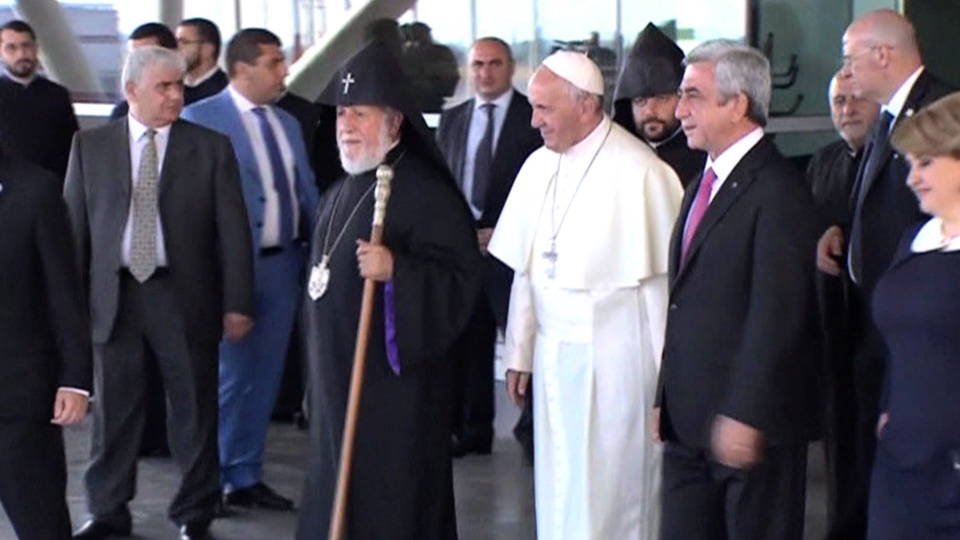
Pope Francis says the Roman Catholic Church should seek forgiveness from gay people for the way they have treated them. The pontiff also said the church should seek forgiveness for the way it has treated women and for "blessing so many weapons."
TOPICS:
Catholic Church
Pope Francis
LGBT
Millions Pay Homage to Orlando Victims in Pride Events Across U.S.
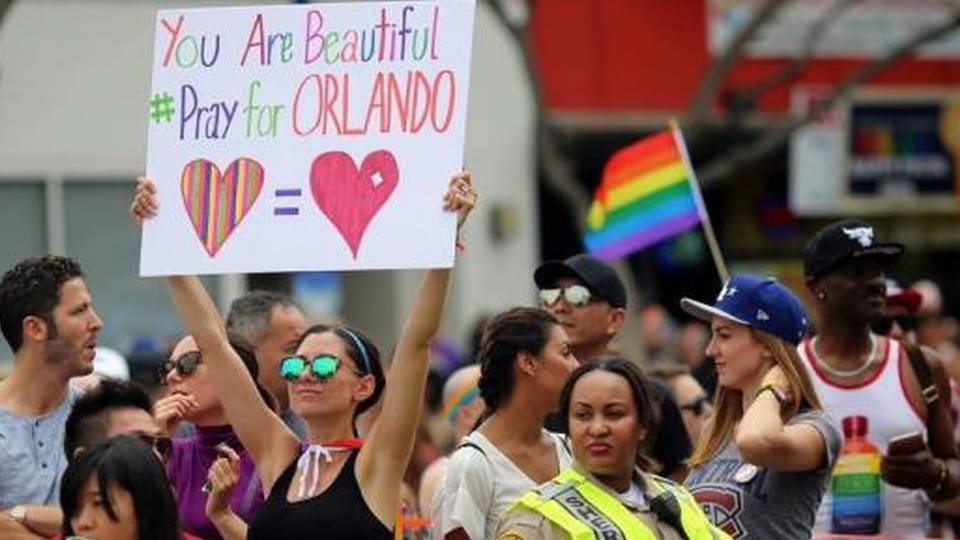
Pope Francis’ remarks came as millions of people took to the streets for LGBTQ pride celebrations across the United States and around the world. Marchers paid homage to the 49 people killed in a massacre at a gay nightclub in Orlando, Florida, two weeks ago.
TOPICS:
Orlando Massacre
LGBT
Black Lives Matter Pulls Out of San Francisco Pride over Increased Policing
In San Francisco, several honorees, including Black Lives Matter, pulled out of the nation’s largest pride event over the increased police presence in the wake of the Orlando massacre. "For us, celebrating Pride this year meant choosing between the threat of homophobic vigilante violence and the threat of police violence," the group said in a statement. "Ultimately we chose to keep our people safe by not participating in any event that would leave our communities vulnerable to either."
TOPICS:
Black Lives Matter
LGBT
Police Brutality
Iraqi Forces Claim Control of Fallujah
Iraqi Prime Minister Haider al-Abadi says Iraq’s military has taken full control of the city of Fallujah after it was captured by ISIS in 2014. Iraqi forces backed by U.S. airstrikes launched the offensive to retake the city last month.
TOPICS:
Iraq
Islamic State
Report: CIA, Saudi Weapons Meant for Syrian Rebels End Up on Black Market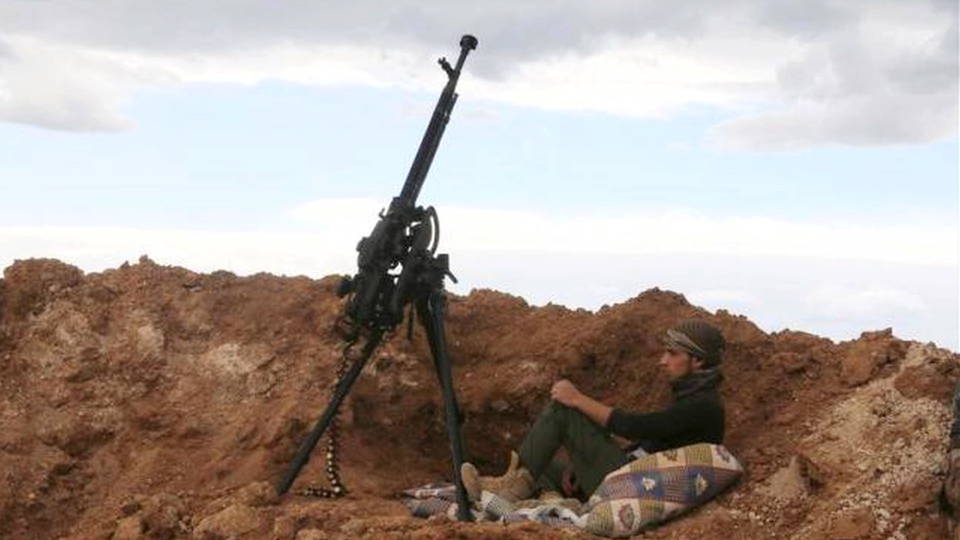
The New York Times and Al Jazeera report millions of dollars in weapons being shipped to Jordan by the CIA and Saudi Arabia for the intended use of Syrian rebels have been systematically stolen by Jordanian intelligence operatives and sold on the black market. The stolen weapons were used in a shooting in November that killed two Americans and three other people at a training facility in Amman.
TOPICS:
Syria
Somalia: Cabinet Minister Among 15 Killed in Hotel Attack
In Somalia, a Cabinet minister is among 15 people killed in an attack on a hotel in the capital Mogadishu. At least 34 people were injured in the attack. Authorities said officers killed four attackers with the militant group al-Shabab.
TOPICS:
Somalia
West Virginia: 25 Killed in Floods; Federal Disaster Declared
In West Virginia, at least 25 people have been killed in one of the deadliest floods in the state’s history. Tens of thousands have been left without power, and homes and roads have been destroyed. President Obama has declared a major disaster. Teacher Kristin Richmond described the damage.
Kristin Richmond: "We’ve had some people that have come through that slept in their car last night. They had their animals and their children with them, and they slept in their cars. And there have been some people that just haven’t been able to even return to their homes at all to see what’s there."
TOPICS:
Climate Change
Jesse Williams Gives Powerful Address on Racism at BET Awards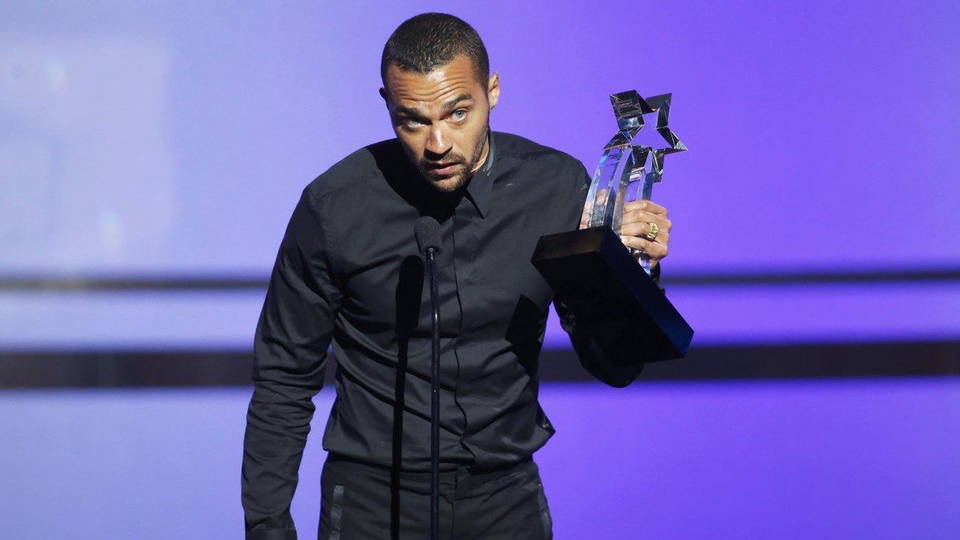
And actor Jesse Williams, known for his role on the TV show "Grey’s Anatomy," earned a standing ovation Sunday night for his address at the BET Awards. As he accepted the Humanitarian Award, Williams paid homage to police shooting victims, including Rekia Boyd and Tamir Rice, who would have turned 14 on Saturday. Here’s how he concluded his speech.
Jesse Williams: "We’ve been floating this country on credit for centuries, yo, and we’re done watching and waiting while this invention called whiteness uses and abuses us, burying black people out of sight and out of mind, while extracting our culture, our dollars, our entertainment like oil—black gold—ghettoizing and demeaning our creations, then stealing them, gentrifying our genius and then trying us on like costumes before discarding our bodies like rinds of strange fruit. The thing is, though—the thing is that just because we’re magic doesn’t mean we’re not real."
TOPICS:
Racism
Police Brutality
Donate today:
Follow:



SPEAKING EVENTS
Headlines:U.K. Crisis Widens After Brexit Vote; Corbyn Faces Coup Within Labour Party

Britain remains in a widening crisis days after voters chose to leave the European Union. British Prime Minister David Cameron has announced his resignation. Labour leader Jeremy Corbyn is facing a coup within his own party as more than a dozen members of his shadow cabinet have resigned or been fired. Scotland has announced it will take any steps needed to stay inside the European Union, including possibly holding a second independence referendum. Global stock markets have plummeted. More than $2 trillion was wiped off global equity markets on Friday in the biggest daily loss ever. Earlier today the British pound hit a 31-year low. With his own political fate uncertain, British Finance Minister George Osborne sought to reassure the British people.
George Osborne: "It will not be plain sailing in the days ahead. But let me be clear, you should not underestimate our resolve. We were prepared for the unexpected, and we are equipped for whatever happens. And we are determined that, unlike eight years ago, Britain’s financial system will help our country deal with any shocks and dampen them, not contribute to those shocks or make them worse."
U.S. Secretary of State John Kerry is headed to Brussels and London to discuss the political and economic upheaval caused by the Brexit vote. Meanwhile, Baroness Sayeeda Warsi, the first Muslim woman to serve in the British Cabinet, says the vote to leave the EU has sparked an uptick in racist abuse. We’ll have more on Brexit after headlines.
TOPICS:
Britain
Jeremy Corbyn
Conservatives Win Most Seats in Spanish Elections; Podemos Comes in Third

In Spain, the conservative People’s Party of acting Prime Minister Mariano Rajoy has won the largest number of seats in Parliament, but fallen short of an outright majority. The Socialist party came in second, with the left-wing Unidos Podemos alliance coming in third. Podemos leader Pablo Iglesias said the results were disappointing.
Pablo Iglesias: "I want to say that the results tonight are not satisfactory for us. We had different expectations. We are also worried about the loss of support from the progressive bloc. It’s true that we consolidated ourselves as the political option which would have a determining role in the present and future of our country. It’s true that what we have done in the past two years is historic and unprecedented in the history of our country. But it’s also true that we expected different electoral results tonight."
TOPICS:
Spain
California: At Least 7 Stabbed in Clashes Between White Nationalists, Counterprotesters
In California, at least seven people have been stabbed and 10 hospitalized after a confrontation between white nationalists and anti-racist counterprotesters at the state capital in Sacramento. White nationalist leader Matthew Heimbach said only one of the people injured was from his group, the Traditionalist Worker Party, which organized the rally to "make a statement about the precarious situation our race is in" after what it called "brutal assaults" at Donald Trump events. Hundreds of anti-racist demonstrators outnumbered the white nationalists.
Columnist George Will Leaves GOP over Donald Trump

The leading conservative columnist and commentator George Will has left the Republican Party over the presumed nomination of Donald Trump. Speaking on Fox News Sunday, Will said he had changed his voter registration in Maryland to "unaffiliated" 23 days ago.
George Will: "Shortly after Trump became the presumptive nominee, he had a summit meeting with Paul Ryan, where they stressed their common principles and their vast shared ground, which is much more important than their differences. I thought that was puzzling, doubly so because Paul Ryan still didn’t endorse him. After Trump went after the Mexican judge from northern Indiana, then Paul Ryan endorsed him. And I decided that, in fact, this is not my party anymore."
Will did not say whom he would support in the 2016 election.
Senate Majority Leader McConnell Refuses to Say If Trump Qualified to Be President
In the latest sign of discord between Trump and the Republican Party, Senate Majority Leader Mitch McConnell has refused to say whether Trump is qualified to be president. McConnell was questioned Sunday by ABC’s George Stephanopoulos.
George Stephanopoulos: "Sixty-four percent of Americans say they don’t think that Donald Trump is qualified to be president. Do you believe he’s qualified? And how do you convince all those voters who think he isn’t?"
Sen. Mitch McConnell: "Well, look, I think there’s no question that he’s made a number of mistakes over the last few weeks. I think they’re beginning to right the ship. It’s a long time until November. And the burden obviously will be on him to convince people that he can handle this job."
Guardian Journalists Barred from Trump Event in Scotland

Trump has barred yet another journalist from his events. During Trump’s two-day visit to his golf resorts in Scotland over the weekend, Guardian reporter Ewen MacAskill asked Trump about how British politicians weren’t meeting with Trump because he is "regarded as toxic." Trump called him a "nasty guy." The following day, Ewen MacAskill and a Guardian photographer were denied entrance to Trump’s golf course. A security press list reportedly had "No Guardian or Buzzfeed" penciled on top. Among other outlets whose journalists have been booted from Trump events or explicitly banned are Politico, Univision, The Huffington Post, The Daily Beast and The Des Moines Register.
TOPICS:
Scotland
Donald Trump
DNC Platform Committee Rejects Proposals Against Fracking, TPP, Israeli Occupation

The committee drafting the Democratic Party’s platform has rejected a number of measures proposed by members appointed by Bernie Sanders. Meeting in St. Louis, Missouri, on Friday, members rejected measures to oppose the Trans-Pacific Partnership, or TPP, declare a national moratorium on fracking, and call for a $15-an-hour federal minimum wage and an end to Israeli occupation and illegal settlements. Sanders said he was "disappointed and dismayed" by the defeat of proposals on trade, but "pleased" over language about breaking up big banks. Speaking on MSNBC’s "Morning Joe" Friday, Sanders said he has turned his focus to the party platform.
Nicolle Wallace: "Are you going to vote for Hillary Clinton in November?"
Sen. Bernie Sanders: "Yes. Yeah, I think the issue right here is, I’m going to do everything I can to defeat Donald Trump. ... What my job right now is, is to fight for the strongest possible platform in the Democratic convention. And as we speak, in St. Louis, that’s going on right now. And that means a platform that represents working people, that stands up to big money interests. And that’s what we’re trying to do."
TOPICS:
Democratic Party
Bernie Sanders
TPP
Fracking
Israel & Palestine
DNC Platform Includes Historic Call to Repeal Anti-Choice Hyde Amendment
Hillary Clinton’s campaign hailed the draft Democratic platform as "the most ambitious and progressive our party has ever seen." For the first time, the platform includes an explicit call to repeal the Hyde Amendment, the decades-old ban on federal funding for abortion which disproportionately impacts the poor and women of color. In related news, the Supreme Court rules today on the most significant abortion rights case in a generation, concerning anti-choice restrictions in Texas.
TOPICS:
Democratic Party
Abortion
Pope Francis: Catholic Church Should Seek Forgiveness from Gay People, Women

Pope Francis says the Roman Catholic Church should seek forgiveness from gay people for the way they have treated them. The pontiff also said the church should seek forgiveness for the way it has treated women and for "blessing so many weapons."
TOPICS:
Catholic Church
Pope Francis
LGBT
Millions Pay Homage to Orlando Victims in Pride Events Across U.S.

Pope Francis’ remarks came as millions of people took to the streets for LGBTQ pride celebrations across the United States and around the world. Marchers paid homage to the 49 people killed in a massacre at a gay nightclub in Orlando, Florida, two weeks ago.
TOPICS:
Orlando Massacre
LGBT
Black Lives Matter Pulls Out of San Francisco Pride over Increased Policing
In San Francisco, several honorees, including Black Lives Matter, pulled out of the nation’s largest pride event over the increased police presence in the wake of the Orlando massacre. "For us, celebrating Pride this year meant choosing between the threat of homophobic vigilante violence and the threat of police violence," the group said in a statement. "Ultimately we chose to keep our people safe by not participating in any event that would leave our communities vulnerable to either."
TOPICS:
Black Lives Matter
LGBT
Police Brutality
Iraqi Forces Claim Control of Fallujah

Iraqi Prime Minister Haider al-Abadi says Iraq’s military has taken full control of the city of Fallujah after it was captured by ISIS in 2014. Iraqi forces backed by U.S. airstrikes launched the offensive to retake the city last month.
TOPICS:
Iraq
Islamic State
Report: CIA, Saudi Weapons Meant for Syrian Rebels End Up on Black Market

The New York Times and Al Jazeera report millions of dollars in weapons being shipped to Jordan by the CIA and Saudi Arabia for the intended use of Syrian rebels have been systematically stolen by Jordanian intelligence operatives and sold on the black market. The stolen weapons were used in a shooting in November that killed two Americans and three other people at a training facility in Amman.
TOPICS:
Syria
Somalia: Cabinet Minister Among 15 Killed in Hotel Attack

In Somalia, a Cabinet minister is among 15 people killed in an attack on a hotel in the capital Mogadishu. At least 34 people were injured in the attack. Authorities said officers killed four attackers with the militant group al-Shabab.
TOPICS:
Somalia
West Virginia: 25 Killed in Floods; Federal Disaster Declared

In West Virginia, at least 25 people have been killed in one of the deadliest floods in the state’s history. Tens of thousands have been left without power, and homes and roads have been destroyed. President Obama has declared a major disaster. Teacher Kristin Richmond described the damage.
Kristin Richmond: "We’ve had some people that have come through that slept in their car last night. They had their animals and their children with them, and they slept in their cars. And there have been some people that just haven’t been able to even return to their homes at all to see what’s there."
TOPICS:
Climate Change
Jesse Williams Gives Powerful Address on Racism at BET Awards

And actor Jesse Williams, known for his role on the TV show "Grey’s Anatomy," earned a standing ovation Sunday night for his address at the BET Awards. As he accepted the Humanitarian Award, Williams paid homage to police shooting victims, including Rekia Boyd and Tamir Rice, who would have turned 14 on Saturday. Here’s how he concluded his speech.
Jesse Williams: "We’ve been floating this country on credit for centuries, yo, and we’re done watching and waiting while this invention called whiteness uses and abuses us, burying black people out of sight and out of mind, while extracting our culture, our dollars, our entertainment like oil—black gold—ghettoizing and demeaning our creations, then stealing them, gentrifying our genius and then trying us on like costumes before discarding our bodies like rinds of strange fruit. The thing is, though—the thing is that just because we’re magic doesn’t mean we’re not real."
TOPICS:
Racism
Police Brutality
Donate today:
Follow:




SPEAKING EVENTS

Sotomayor "Tells It Like It Is" & Slams Racial Profiling, Illegal Search and Seizure in Scathing Dissent
WORK WITH DN!

News Producer
Office Coordinator
Senior TV Producer
BREAKING NEWS

Breaking: Supreme Court Strikes Down Texas Anti-Choice Measures in Victory for Abortion Rights
207 West 25th Street, 11th Floor
New York, New York 10001, United States
----------------------------
----------------------------


No comments:
Post a Comment